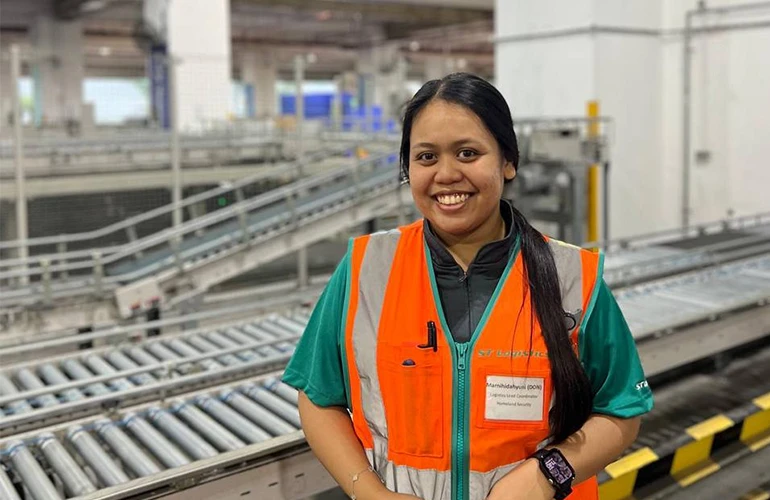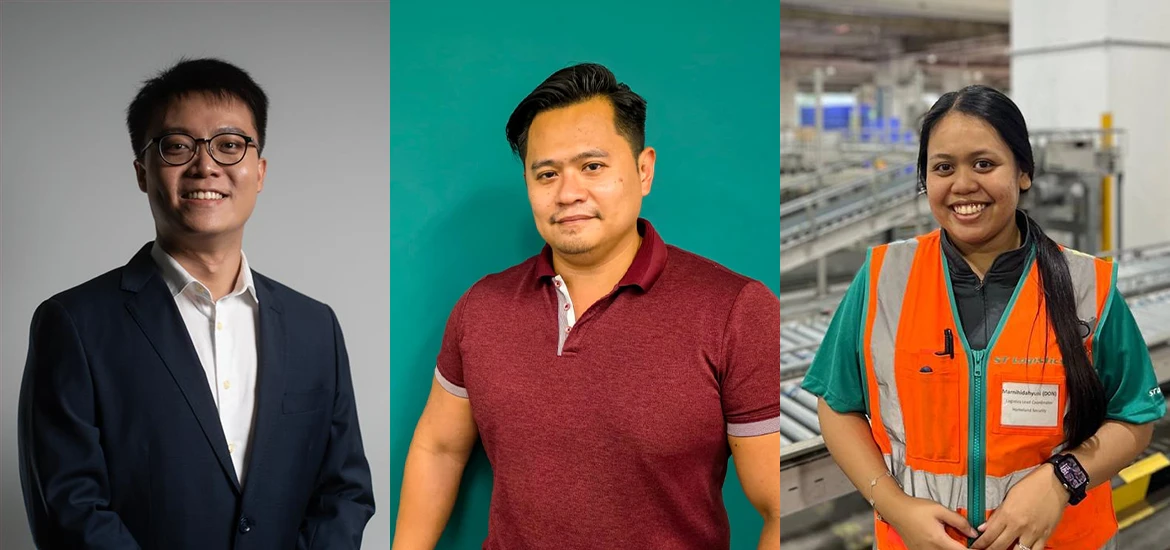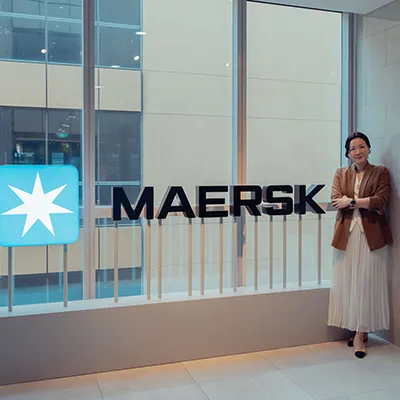Melvin Ang is an Assistant Manager in Analytics at ST Logistics. He uses data insights to enhance business performance and develops new solutions, such as mobile applications and dashboards, to help business units optimise their operations. Melvin has a Bachelor’s Degree in Materials Science and Engineering from Nanyang Technological University and a Specialist Diploma in Predictive Analytics from Singapore Polytechnic.
Melvin Ang
- Tell us more about the Majulah application you developed with your team.
- How did ST Logistics support you on this journey?
- What is your take on logistics in Singapore?
Muhammad Fadhlullah bin Aziz
- Tell us more about the eMedCab.
- How has ST Logistics supported your career growth?
- What is your take on logistics in Singapore?
Marnihidahyuni Binte Tohani

1. Tell us more about the Majulah application you developed with your team.
I worked with my team to come up with the Majulah application, which was used for logistics management by ST Logistics during Singapore’s 2025 General Elections. Through the application, we were able to manage the deployment and recovery of items used at over 1,500 rally sites, polling stations and counting centres nationwide. Integrating real-time monitoring, geo-location tracking and route planning into the application helped ensure the optimal use of time and manpower, while reducing the carbon footprint from transportation vehicles.
2. How did ST Logistics support you on this journey?
ST Logistics has always been a strong supporter of employees’ career development and one of its in-house upskilling initiatives is the Skills Allowance Scheme, which encourages staff members to pick up technical and digital skills. Under the scheme, a cash reward is offered to employees who can develop productivity improvement projects with AI capabilities. Before I joined the company, I had no experience in developing mobile applications at all, but was able to build new skill sets in tech by tapping the scheme. I also worked very closely with my IT department to bring the Majulah application to life by relying on their insights in application development and user experience optimisation.
3. What is your take on logistics in Singapore?
Logistics by itself is not very sexy, but it is a promising field with growing opportunities that cut across different areas, whether it’s in e-commerce, warehousing or air and sea freight. Younger folks who are keen to join the field will certainly have a different taste of logistics as compared to the past. While jobs used to be more manual and labour-intensive, nowadays we incorporate automation and technologies to help increase efficiency in our operations. For instance, at ST Logistics, we have four-way shuttles to store and retrieve goods, as well as mini load systems to handle small items. On top of that, we use data analytics and AI to improve the flow of goods by optimising warehouse space. This allows employees in our workforce to move on to higher-value roles across the value chain.
Learn why more young people are drawn to tech-related roles in Singapore’s logistics field

Muhammad Fadhlullah bin Aziz is a Higher Executive in Operations at ST Logistics. He oversees the day-to-day operations of the eMedCab, an innovation developed by the company to streamline logistics management for paramedics who are on the frontlines saving lives. Fadhlullah has a Diploma in Supply Chain Management and Innovation from Singapore Polytechnic.
1. Tell us more about the eMedCab.
The eMedCab is an unmanned smart cabinet equipped with AI, sensors and an HD camera that digitises inventory management and records transactions in real-time. Located at various hospitals islandwide, the eMedCab allows Singapore Civil Defence Force (SCDF) paramedics to quickly and seamlessly replenish medical supplies on the go. Previously, paramedics had to return to the fire station to stock up on supplies after conveying patients to hospitals, but with the eMedCab, they can now pick up items there too by simply scanning a QR code. They do not need to spend time on manual inventory management as well since the eMedCab system will automatically record the products and quantities taken.
As part of my job, I monitor the inventory levels in the eMedCabs to ensure that they are well-stocked to support the operations of our paramedics. Based on data collected, we found that the eMedCab has helped improve operational efficiency by up to 30 per cent – an ambulance typically answers around eight calls in a day, but after the eMedCab was implemented, the number has jumped to 10 to 11 calls. I also work closely with my business development team to oversee the roll-out of new eMedCabs.
Six eMedCabs have been deployed so far, and there are plans to have another 19 at fire stations by the end of 2026. It feels extremely meaningful to know that my work is supporting the SCDF in performing critical life-saving duties for Singaporeans.
2. How has ST Logistics supported your career growth?
I was working in a warehouse-related role when I first joined ST Logistics, but after a couple of years on the job, I decided it was time to try something new. That was when this opportunity to work on the eMedCab project came up. I was unsure at first whether I had the necessary skills to take this on but the support of my company and colleagues allowed me to rise above this challenge. To prepare me for my new role, I received on-the-job training from my business development team and learnt how to handle the eMedCab’s technical systems. I also utilised the Skills Allowance Scheme to pick up new tech skills in Microsoft solutions like Power BI and Power App, which I currently apply in my day-to-day work. In addition, the company has developed an in-house application for employees to take short bite-sized courses on the go. Known as the CPO application, it provides access to over 25,000 courses from external platforms and allows us to take charge of our own learning to advance our career goals.
3. What is your take on logistics in Singapore?
Singapore’s position as a logistics hub at the crossroads of multiple trade routes means that logistics will remain an evergreen field here. Younger Singaporeans might have the misconception that logistics is outdated and backward, but I can assure you that is not the case, especially in the context of ST Logistics. The company is always trying to incorporate automation and AI technologies in our work so that we can stay ahead of our competitors and offer up-to-date solutions to our customers.
Discover how upskilling helped Marshall to pursue his passion in healthtech innovation

Marnihidahyuni Binte Tohani is a Logistics Supervisor at ST Logistics. She oversees day-to-day operations in the company’s warehouse, which provides warehousing solutions and inventory management services to clients. Marnihidahyuni graduated from ITE with a Higher Nitec in Culinary Arts.
1. How do you think automation has helped you in your job?
I believe automation can help us in our work processes by improving productivity and accuracy. By implementing mini load systems and automated mobile robots in the warehouse, employees no longer need to use the forklift to travel to different locations for retrieval and storage. Instead, goods can be delivered to us automatically through the use of technology, lightening our workload. This increases our efficiency – previously, my team handled about 160 orders a day, but with the deployment of automation, we are now able to coordinate up to 300 orders daily.
Automation has freed me from other manual tasks too, which allows me to handle higher-value operations in the warehouse. This includes using data to optimise resource allocation, scheduling and planning, as well as maintaining the automated systems we have. In fact, I like to tell others my favourite part of the job is that I actually get to work with robots!
2. How has ST Logistics supported your career growth?
The company is extremely supportive of my upskilling efforts. To manage the new automated systems that were implemented, I participated in the Career Conversion Programme and received structured on-the-job training to better navigate these changes. This allowed me to make the shift from a part-time warehouse assistant to a Logistics Supervisor, where I now oversee a team of eight employees. I was also given the opportunity to attend training courses – one of them is the Change Management Programme which provided me with insights on how automation can help us be more productive in our work.
I’m always looking out for new areas of improvement and ways to further enhance work processes. While it might be scary at first, I believe that in the face of automation and technology, it’s critical for us to upskill ourselves so we can better adapt to changing environments.







